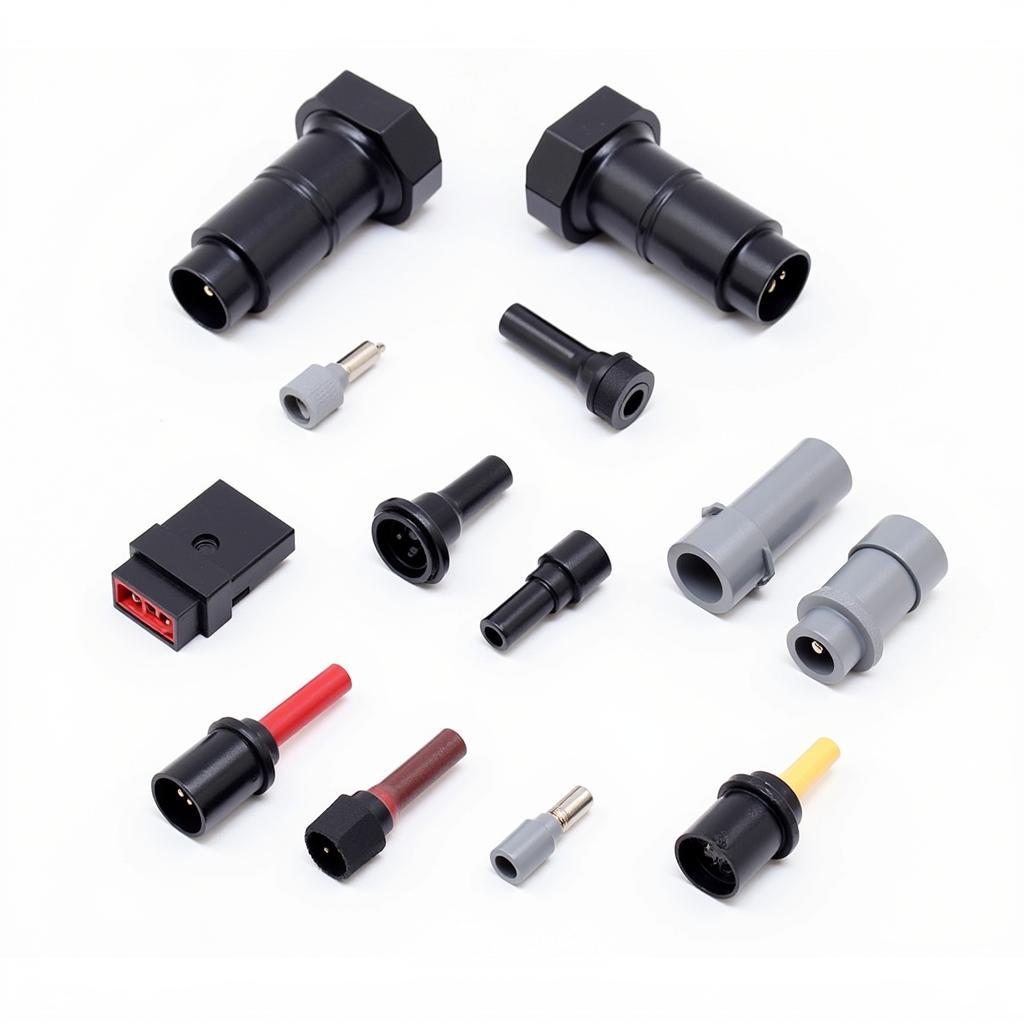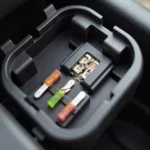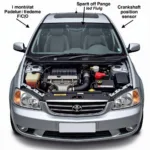OBD2 injector clips play a crucial role in the smooth operation of your vehicle’s fuel injection system. These small but mighty connectors secure the electrical connections between the fuel injectors and the engine control unit (ECU). While they might seem insignificant, faulty OBD2 injector clips can lead to a range of performance issues, leaving you stranded with a car that won’t start or runs rough.
Understanding OBD2 Injector Clips
OBD2 injector clips are specialized electrical connectors designed to withstand the harsh conditions under the hood of a vehicle. They are typically made from durable, heat-resistant plastic and feature metal terminals that provide a secure and reliable connection.
These clips ensure the fuel injectors receive the proper electrical signals from the ECU, allowing them to deliver precise amounts of fuel to the engine cylinders at the right time. This precise fuel delivery is essential for optimal engine performance, fuel efficiency, and reduced emissions.
Common Problems with OBD2 Injector Clips
Over time, OBD2 injector clips can become brittle, cracked, or corroded due to exposure to heat, vibration, and moisture. When this happens, the electrical connection between the fuel injector and the ECU can be disrupted, leading to a variety of problems, including:
- Engine misfires: A loose or broken connection can cause the fuel injector to malfunction, resulting in mistimed or insufficient fuel delivery.
- Rough idling: Intermittent electrical contact can cause the engine to idle erratically.
- Poor fuel economy: A faulty connection can disrupt the fuel-air mixture, leading to decreased fuel efficiency.
- Check Engine light: The ECU will detect the malfunctioning injector and trigger the Check Engine light.
- Difficulty starting: In severe cases, a completely disconnected injector can prevent the engine from starting altogether.
Troubleshooting OBD2 Injector Clip Issues
If you suspect your vehicle is experiencing problems related to OBD2 injector clips, it’s essential to diagnose and address the issue promptly. Here are some steps you can take:
- Visual inspection: Begin by visually inspecting the injector clips for signs of damage, such as cracks, burns, or corrosion. Pay close attention to the locking tabs and the wiring harness.
- Wiggle test: Gently wiggle the injector clip while the engine is running. If the engine stumbles or the RPMs fluctuate, it could indicate a loose connection.
- Multimeter test: Use a multimeter to check for continuity between the injector clip terminals and the corresponding wires in the wiring harness.
- Cleaning and tightening: If you find any dirt, debris, or corrosion, carefully clean the injector clips and terminals using electrical contact cleaner. Ensure the clips are properly secured to the injectors.
Replacing OBD2 Injector Clips
In some cases, simply cleaning and tightening the injector clips might not be enough to resolve the issue. If the clips are damaged beyond repair or you’re experiencing persistent electrical problems, it’s best to replace them.
Fortunately, OBD2 injector clips are relatively inexpensive and easy to replace. You can purchase replacement clips online or from your local auto parts store. Be sure to select the correct clips for your vehicle’s make, model, and engine type.
Expert Insights
“Don’t underestimate the importance of those little injector clips,” advises John Smith, a veteran automotive technician with over 20 years of experience. “A faulty connection can lead to a cascade of problems that can be frustrating and expensive to diagnose. Regular inspection and maintenance of your injector clips can save you a lot of trouble in the long run.”
Conclusion
OBD2 injector clips are essential components of your vehicle’s fuel injection system, ensuring optimal engine performance and fuel efficiency. Regular inspection, cleaning, and prompt replacement of damaged clips can help prevent a wide range of issues and keep your vehicle running smoothly for years to come.
FAQs
Q: How often should I inspect my OBD2 injector clips?
A: It’s a good practice to visually inspect your injector clips at least once a year or whenever you’re performing other under-hood maintenance.
Q: Can I drive my car with a loose injector clip?
A: While you might be able to drive for a short distance, it’s not recommended as it can lead to engine damage and other problems.
Q: Are all OBD2 injector clips the same?
A: No, different vehicle manufacturers use different types of injector clips. It’s crucial to select the correct ones for your specific vehicle.
Q: Can I replace OBD2 injector clips myself?
A: Yes, replacing injector clips is a relatively simple DIY task that most car owners can handle with basic tools.
Q: Where can I find the correct OBD2 injector clips for my car?
A: You can purchase replacement clips online, from your local auto parts store, or from your dealership.
Need further assistance with OBD2 injector clips or any other automotive diagnostic needs? Contact us via WhatsApp: +1(641)206-8880 or Email: [email protected]. Our team of experts is available 24/7 to provide you with the support you need.


